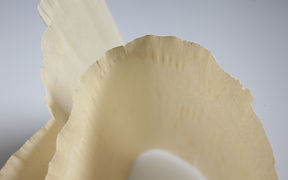Laureen Mahler uses origami folding to create bio-based packaging that is also pleasant to look at

Laureen Mahler is looking into cellulose-based materials in a search for solutions to the sustainability problems of the packaging industry. In her doctoral research she also wants to change the attitudes of consumers toward packages and to get them to see their value as beautiful objects and not merely as examples of throwaway culture.
‘Visual design has great significance in how a package can continue its life as an object. I want to create completely new kinds of packages that get people to say: “this sure is beautiful – I wonder how I could use it again”’, says the US-German Mahler, who has a lengthy background in the teaching and research of visual design and graphic art.
As structures, origami folds offer an excellent starting point for the fulfilment of functional requirements of packaging.
‘Objects based on origami folding function very well as packages. They are very strong and flexible. I want to create and build completely new kinds of objects which affect both the environment and how people use them.’
Mahler is conducting her doctoral research in the Cellugami project, combining design with engineering skills, materials sciences, and mathematical modelling. She finds the practical applications of the work to be especially inspiring.
‘I get to work with experts from different fields to create and build new things and objects. In my work theoretical research combines seamlessly with working with my hands. In the laboratory I get to handle different kinds of cellulose-based materials and to produce paper, out of which I make packages through the means of design.’
An enthusiastic multidisciplinary atmosphere
One reason for Mahler's doctoral studies at Aalto is that she has long had appreciation for Aalto University's high-quality research in the arts, which enjoys a very good reputation around the world. Mahler, who moved to Finland in the spring of 2022, got immediately caught up with her doctoral studies and the level of Aalto's doctoral training.
‘Over here the students are put to work right away: there is plenty of course work, encounters, and discussions that help us move forward on our paths toward being good researchers. Aalto is an open community where people are genuinely interested in what the others are doing. It is wonderful to be part of this kind of an atmosphere of information sharing and promotion.’
The doctoral school of the Bioinnovation Center offers a multidisciplinary environment with an enthusiastic atmosphere.
‘We meet regularly with the doctoral students, we exchange ideas, and we get feedback for our own work. The activities of the Bioinnovation Center are based both on cross-disciplinary research projects and on the idea that we are all working to reach shared goals.’
Mahler has lived for long periods of time in both the United States and Germany, and feels that Finland is also her home. After spending years in Berlin, she appreciates the feeling of space that prevails in Helsinki.
‘In my free time I like to go outdoors for a run, or to learn about different parts of the city. Movies are close to my heart, and Helsinki is full of wonderful little cinemas. Music is also important for me. I listen to all kinds, from rock, jazz, and blues to classical music. The number of record stores here is actually dangerous for me!’
Text: Marjukka Puolakka.
Aalto University Bioinnovation Center
To achieve human wellbeing in planetary boundaries, we need new sustainable solutions to wisely use our natural resources. The Bioinnovation Center especially focuses on innovations in sustainable bio-based materials, with special focus on textiles and packaging.

- Published:
- Updated:
Read more news

Call for two Assistant Professors in Computational Physics
The Department of Applied Physics at Aalto University School of Science invites applications for two Assistant professor positions in Computational Physics.
Auditor's expertise in climate risks affects the quality of the client's climate risk disclosures
The study was carried out in international cooperation with universities from several countries
Finland is strongly investing in AI and establishing an ELLIS Institute to accelerate research and attract talent
Public and private sector investment are coming together to launch ELLIS Institute Finland.